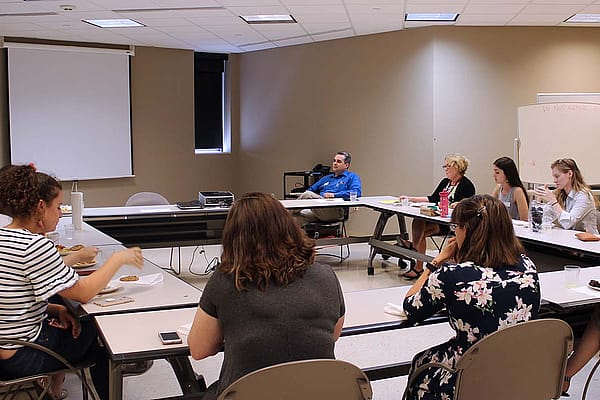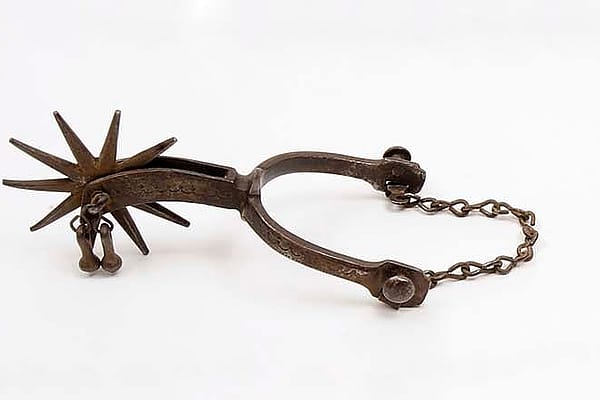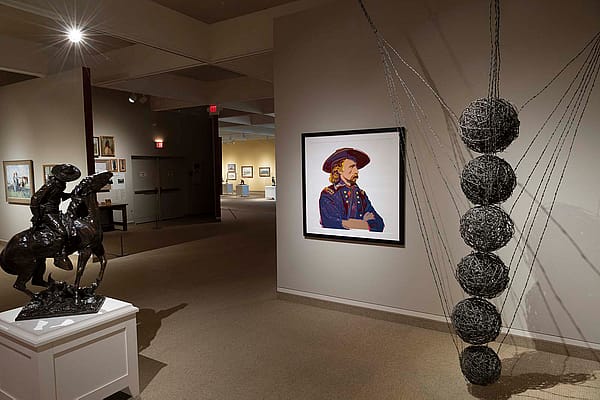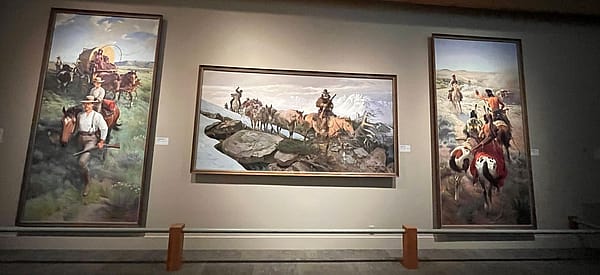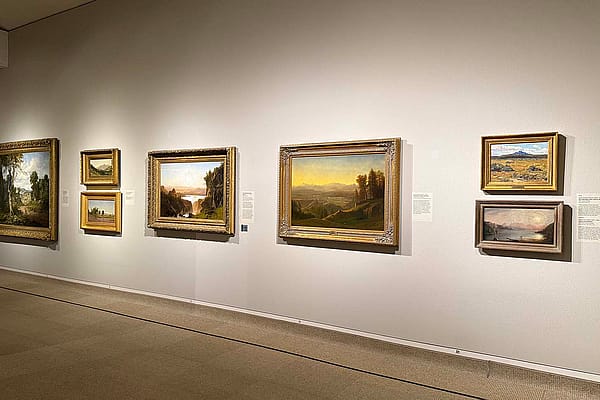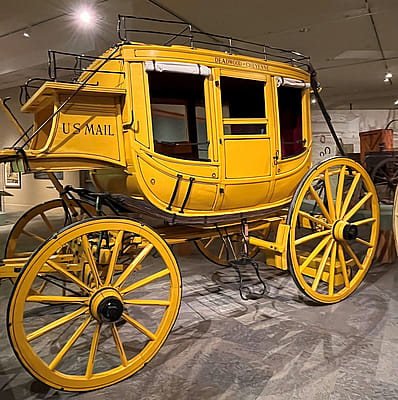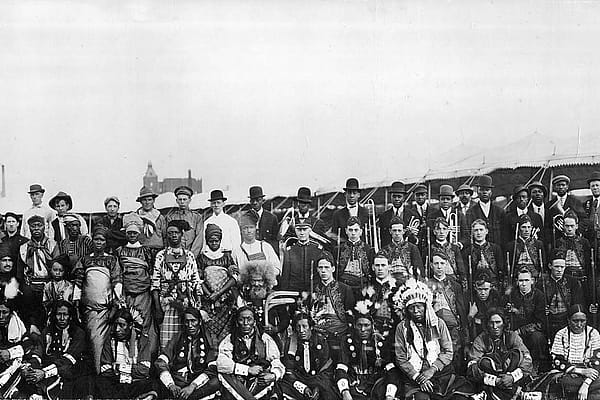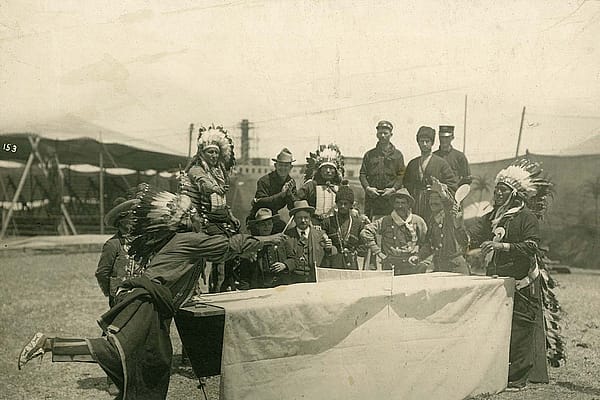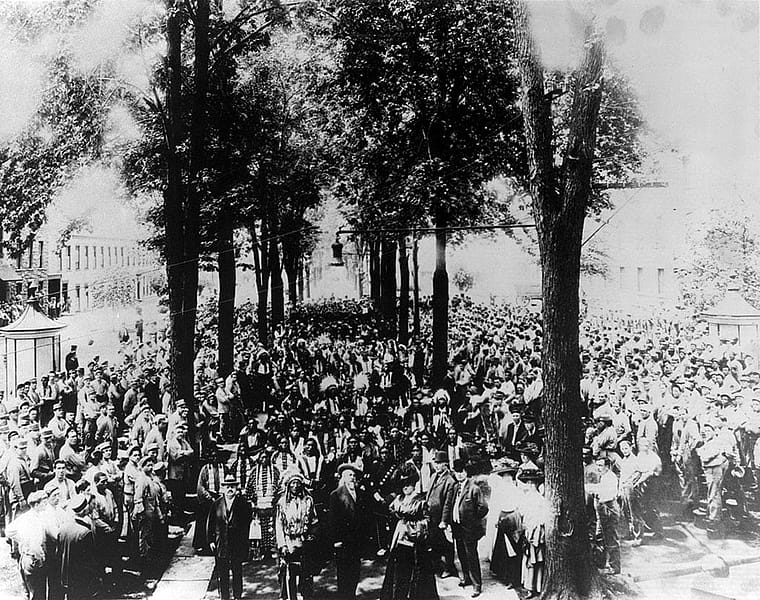
“No swearing or drinking in my Company since I got good” – Points West Online
Originally published in Points West magazine
Winter 2003
“No swearing or drinking in my Company since I got good”: Buffalo Bill Finds God
By Steve Friesen
Guest Author
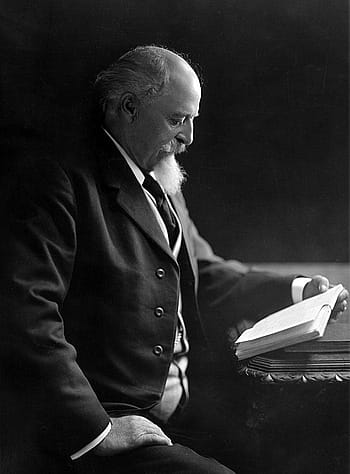
William F. “Buffalo Bill” Cody sat alone in his French hotel. It had been over two months since he learned of the dismissal of his divorce suit. The judge had rejected all of his charges against Louisa. Then the judge went further, commenting that, despite Louisa’s wifely devotion, Bill had been “cruel to her and heaped indignities upon her.” Those words had been rolling around in his head ever since he saw them in the newspapers. All of his life he had tried to do the right thing. He had thought that a divorce would make both Louisa and he happier. But the trial just seemed to make everything worse. Daughter Arta died and Louisa accused him of murdering her by breaking her heart with the divorce. And the demands of the Wild West had nearly exhausted him since the death of his friend and partner Nate Salsbury two years earlier. So many of his old friends, and three of his four children had passed on. Maybe his sister Julia was right about God and the promised land, perhaps he needed to change his life. Bill clasped his hands and bowed his head.[1]
This scenario may or may not have occurred. But it is often in the darkest times that people experience a spiritual awakening. Something happened to Buffalo Bill in the spring of 1905 that gave him a change of heart about his life. His sister Julia Cody Goodman, a devout and active Christian, had written to him at least one time about the state of his soul previous to that date. He had replied to her 1901 letter, “You speak about the promised land—And my accepting Christ. Now Julia, no one wants to do right more than I do and I propose to lead an honest life—doing good helping my fellow creature when and wherever I can.” He went on to say he did not want to go to church on Sunday and then cheat his neighbor on Monday, implying that many Christians were hypocritical. He concluded, “If I am too wicked to pray to God, I will ask my Angel Mother and children, who are in Heaven to speak a good word for me to God.” Perhaps that good word, combined with all of the emotional and other struggles he was facing, brought Buffalo Bill a spiritual awakening in spring of 1905.[2]
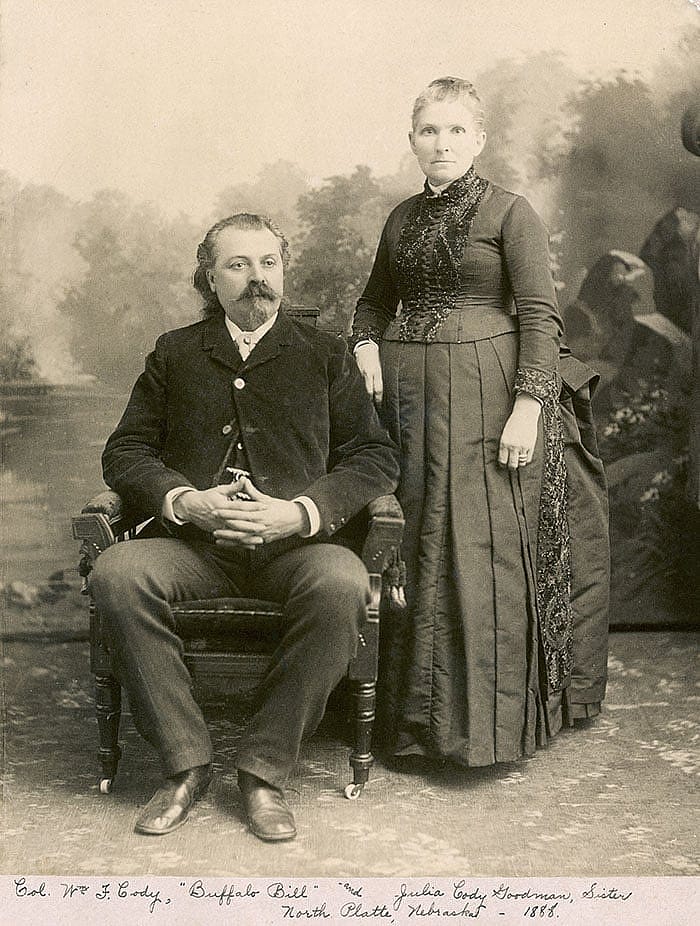
William Cody wrote Julia from France on June 14, 1905:
And it’s in my old age I have found God—And realize how easy it is to abandon sin and serve him. When one stops to think how little they have to give up—to serve God. It’s a wonder so many more don’t do it. A person only has to do right. Through this knowledge I have quit drinking entirely. And quit doing rash things simply by controlling my passions and temper when I find myself getting angry.[3]
Cody’s experience that year was more of a spiritual awakening than a full conversion experience. Unlike some people who rejected religion outright, Buffalo Bill had never really lost God. He did rail at God once after forty-four days of rain nearly ruined his season. In a letter to his partner Nate Salsbury he complained that “God, Christ and the devil is against me.” Characterizing himself as a Jonah, he wrote “I am an Ingersol man from this out. And a damned Joner disgusted with myself and the world—there is no heaven—if so it can stay there and be damed.” Despite his reference to Ingersol, a well-known atheist of the time, he was apparently just letting off steam. He continued to close occasional letters to his sister Julia and her husband Al with the words “God bless you.” Prior to 1905 his feelings about God could be best characterized as ambivalent. His sister Helen Cody Wetmore wrote in her biography of Bill, “He was not averse to church-going, although he was liable even in church to be carried away by the rollicking spirit that was in him.”[4]
William Cody grew up in a religious family. His mother, who had a profound influence on him in his youth and to whom he often referred in later life, was quite devout. When a young Bill broke his leg while trapping, he spent nearly thirty days in a dugout while his friend Dave Harrington went for help. Many of those days were spent reading a small Bible which his mother had presented to him. As an adult he was surrounded by people who had strong religious convictions. One of these was his sister Julia, who was active in churches wherever she lived. Another was his devoted friend and publicist John Burke. When a “delegation of salvationists” visited the Wild West camp at Madison Square Garden in 1897, they reported that Burke was conducting morning prayer services.[5]
Buffalo Bill had always had a soft spot in his heart for the poor and downtrodden. When his show opened at Madison Square Garden he announced a special Orphan’s Day, inviting charity organizations from all over Manhattan to bring their children. Free admission was extended to over 5,000 children. Most appearances by Buffalo Bill’s Wild West in major American and European cities included such free days as well as donations to charitable organizations.[6]
Buffalo Bill also gave money to churches and counted North Platte, Nebraska minister George Allen Beecher among his friends. Beecher remarked upon Cody’s honesty in his autobiography as well as noting, “I learned to respect this man for his virtues, and to be patient with his faults.” And Cody did have his faults, the most prominent being a love of women and alcohol.[7]
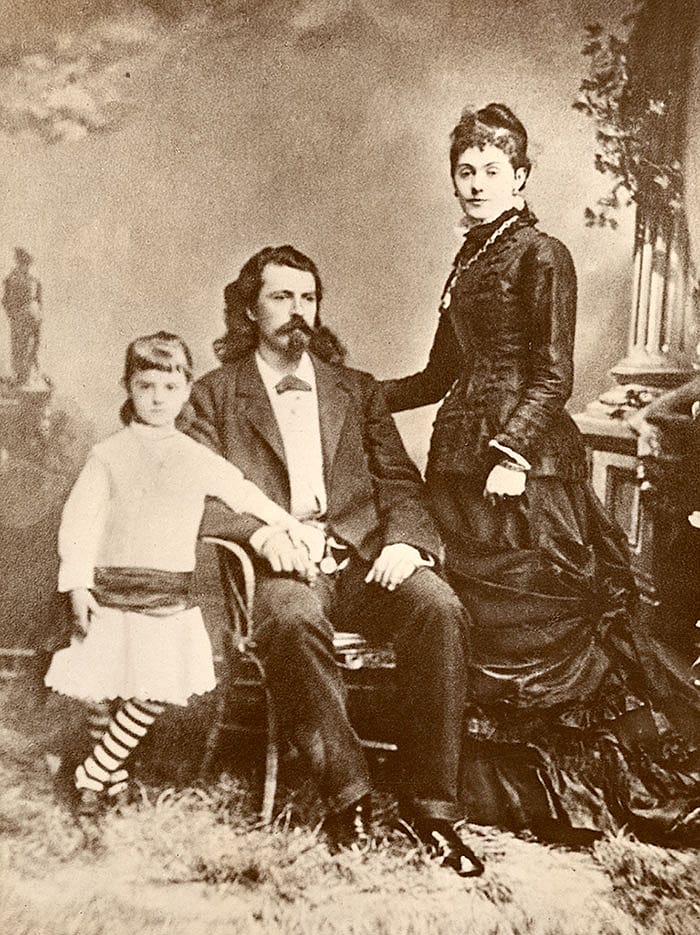
Buffalo Bill was accused of being a womanizer and may have had several affairs. His fame, wealth and good looks made him very attractive to women and his marriage to Louisa was filled with conflict. Their life together was a cycle of arguing, separating and then making up. Their first separation occurred briefly in 1877. Bill then made a first attempt to divorce Louisa in 1883. Bill’s nephew Ed Goodman observed the cycle when he was with the Wild West show in 1887. In 1902, Bill wrote Julia that he was living a life of misery and his marriage grew “more unbearable each year.” That letter marked the beginning of a three year effort at divorce that ended in failure in 1905.[8]
In his younger days, Buffalo Bill acquired a reputation of being a prolific drinker, although most accounts suggest that he was in control of the alcohol rather than it being in control of him. And he generally kept away from alcohol during the show season. In 1901, he wrote his friend Mike Russell, “Oh but I am enjoying this trip—more than I ever did any before. Why—because I am not drinking.” In 1902 he stated in an interview “I’ve got 600 men here and I abstain for the sake of example. They’re not ashamed to keep off drink if I do.” While Buffalo Bill was definitely in control of his habit, it does not appear that he had given up drinking entirely before 1905.[9]
Buffalo Bill was a man with problems when he arrived in France in 1905. His hoped-for divorce had been dismissed and his good name tarnished in newspapers throughout the United States and Europe, his third child had just died, his partner of twenty years had died two years earlier and he was having to take a good look at how he had lived his life. And, at fifty-nine, he discovered he needed God more than he thought. His letter to Julia that June was upbeat. He had found God and he was positive about the future. “I am doing a nice business. And everything running smooth.”[10]

Buffalo Bill’s spiritual awakening was a largely private experience. On rare occasions he did mention his beliefs in public. In a 1907 interview he stated, “I believe that a man gets closer to God out there in the big, free West…. You feel differently about your fellow man out there in the West. He’s nearer to you and God’s nearer to you. You are filled with a true religion and a bigger realization of life.” In 1909 he gave a special performance of the Wild West for the inmates at Auburn prison in New York. He introduced the show with a brief speech saying he had brought it to them since they could not come to him. He concluded, “I hope that when you get out that you will come to see my show. Look to God and put your trust in Him. Think it over now and when you get out God will help you.”[11]
Buffalo Bill did reveal his faith to those with whom he was closest. A month after he found God, he reaffirmed in a letter to his niece Josie, Julia’s daughter, “My faith and trust is in God.” Five months later, he wrote a very affectionate letter to his friend and protege Johnny Baker that included the words “no father ever had a son more loving and faithful” and closed “God bless you my son.” For the next decade, Cody frequently closed letters to friends, family and business partners with “God Bless You.”[12]
Buffalo Bill opened up about his beliefs most to his sister Julia. In 1906, he wrote Julia that he wanted Minister Harper to come to the TE Ranch outside of Cody and deliver one of his “blessed sermons” at a dinner for the neighbors “to bring us closer to God.” In 1914 he wrote, “Let us show the Lord we are Christians. And will carry our cross. God ever bless you my patient brave sister. Remember our brave Christian mother and what she endured.” His letters also reminded Julia that he prayed for her each night.[13]
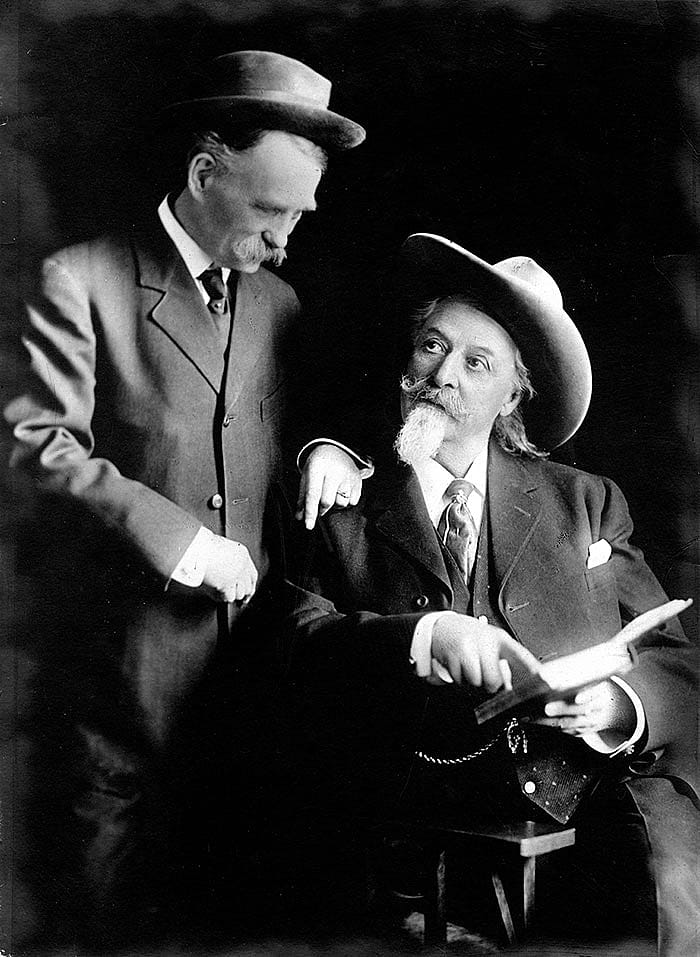
With the change in his spiritual life, Buffalo Bill made changes in the rest of his life just as he had said he would. On May 16, 1906, he wrote Julia, “No swearing or drinking in my Company since I got good.” He was still working on being good years later in 1914 when he wrote that he was “trying to live on earth as God would be pleased to have me live. I slip up some times then I ask God’s forgiveness.” Bill managed to stay away from alcohol for the rest of his life and he began slowly healing his relationship with Louisa. Their last twelve years together were more harmonious than any time before.[14]
On January 9, 1917, Buffalo Bill was baptized by Father Christopher Walsh at the Denver home of his sister Mary Cody Decker. He told the priest that he had never belonged to any religion but that he had always believed in God. He knew he had only a short time to live and he wished to die in the Catholic faith. Father Walsh asked the appropriate questions, and then administered the sacrament. Twenty-four hours later, surrounded by friends and family, William F. “Buffalo Bill” Cody entered his promised land.[15]
Steve Friesen is Director of the Buffalo Bill Museum and Grave in Golden, Colorado.
Notes
1. “Buffalo Bill’s Divorce Suit Dismissed,” London Telegraph, March 25, 1905. 1905 Scrapbook, MS 6 William F. Cody Collection.
2. Letter to Julia Cody Goodman, May 20, 1901, in Stella Foote, Letters from Buffalo Bill, p. 87.
3. Letter to Julia Cody Goodman, June 14, 1905, MS 6 William F. Cody Collection.
4. Letter in Richard J. Walsh, The Making of Buffalo Bill, 1928, pp. 242–243. Helen Cody Wetmore, Last of the Great Scouts, 1918 edition, p. 297.
5. “Julia Cody Goodman’s Memoirs of Buffalo Bill,” p. 485, The Kansas Historical Quarterly, Vol. 28, No. 4, Winter, 1962.
“Rough Riders on their Knees,” New York Journal, May 3, 1897. 1896–1897 Scrapbook, MS 6 William F. Cody Collection.
6. “Orphans at Wild West: Five Thousand Children the Happy Guests of Buffalo Bill,” The New York Press, May 8, 1907, 1896–1897 Scrapbook, MS 6 William F. Cody Collection.
Letter from the Association des Marcunvins acknowledging a donation of gate receipts, Brussels, Belgium, June 6, 1891. MS 6 William F. Cody Collection.
7. George Allen Beecher, A Bishop of the Great Plains, 1950, p. 112.
8. Letter to Julia Cody Goodman, Sept. 24, 1883, p. 33; Letter from Ed Goodman to parents Al and Julia Goodman, March 17, 1887, p. 47; both in Stella Foote, Letters from Buffalo Bill.
“Buffalo Bill’s Divorce,” London Telegraph, March 9, 1905, 1905 Scrapbook, MS 6 William F. Cody Collection.
Letter to Julia Cody Goodman, March 21, 1902, in Stella Foote, Letters from Buffalo Bill, pp. 89–90.
9. Letter to Mike Russell, Jan. 22, 1901, in Sarah J. Blackstone, The Business of Being Buffalo Bill, p. 17.
“Buffalo Bill a Teetotaller,” Sunday Companion, Feb. 28, 1902, Association Files, Buffalo Bill Curator’s Office, Buffalo Bill Center of the West.
10. Letter to Julia Cody Goodman, June 14, 1905, MS 6 William F. Cody Collection.
11. “Buffalo Bill Cody at Close Range” by Charles Darnton, 1907 Scrapbook, MS 6 William F. Cody Collection. “The Show in Prison,” 1909 Scrapbook, MS 6 William F. Cody Collection.
12. Letter to Josie Goodman, July 24, 1905, in Stella Foote, Letters from Buffalo Bill, pp. 120–121. Letter to Johnny Baker, Nov. 12, 1905. Buffalo Bill Museum and Grave Archives.
13. Letter to Julia Cody Goodman, April 21, 1906, MS 6 William F. Cody Collection. Letter to Julia Cody Goodman, June 26, 1914, p. 141; Letter to Julia Cody Goodman, May 2, 1914, pp. 140–141; both in Stella Foote, Letters from Buffalo Bill.
14. Letter to Julia Cody Goodman, May 16, 1906, p. 128; Letter to Julia Cody Goodman, May 25, 1914, p. 141; both in Stella Foote, Letters from Buffalo Bill.
15. William Barrett, “Buffalo Bill Was Baptised by a Sligo Priest,” October, 1960, Catholic Digest, MS 6 William F. Cody Collection.
Post 191
Written By
Nancy McClure
Nancy now does Grants & Foundations Relations for the Center of the West's Development Department, but was formerly the Content Producer for the Center's Public Relations Department, where her work included writing and updating website content, publicizing events, copy editing, working with images, and producing the e-newsletter Western Wire. Her current job is seeking and applying for funding from government grants and private foundations. In her spare time, Nancy enjoys photography, reading, flower gardening, and playing the flute.

